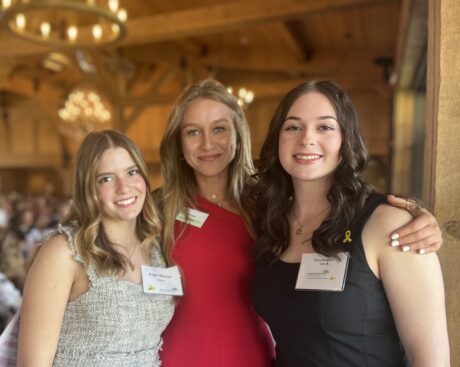
International chef and author Debbie Matzkin says she was born “in a palace of shadows.”
“My family lived in a world of elegance and affluence,” she told almost 300 women gathered March 2 at Tanque Verde Ranch for Connections, the signature program of Women’s Philanthropy at Jewish Philanthropies of Southern Arizona.
Born in New York to a Jewish family, Matzkin grew up in Bogotá, Colombia. She described a life filled with mansions, fine dining, travel, and sublime experiences, including seeing Maria Callas sing at Covent Garden and Rudolf Nureyev dance.
But beneath the picture-perfect exterior, Matzkin suffered trauma and abuse at the hands of her mother, herself a victim of abuse.
Matzkin’s mother “was a perfectionist, consumed by her own pain,” she said.
As a child enduring beatings and constant criticism, Matzkin was unaware of her mother’s history. It was an era when speaking about mental illness was taboo, she said.
Etched on her memory is her mother telling her on her 16th birthday, “I wish you would’ve never been born,” she told the crowd, evoking horrified murmurs.
Matzkin was only eight when her parents left her at a convent school in Lausanne, Switzerland. Bewildered, Matzkin refused to eat until finally a nun insisted she take a bite of a pear.
“I took a bite, and for the first time in weeks, I felt something sweet. I started to cry,” Matzkin said. “That pear became my symbol of resilience, a reminder that even in the bitterness of life, there is sweetness to be found.”
From that time, food became her anchor, said Matzkin, who visits food markets wherever she travels to immerse herself in the local culture.
Matzkin was 10 when her parents came to get her, never explaining why she was sent to the convent. She speculates that her father, who died later that year, may have been trying to shield her from her mother’s abuse.
She was a teen when her mother sent her to Miami to escape Colombia, which had become dangerous, with many kidnappings, especially in the Jewish community.
In Florida, Matzkin met her husband, Giora, and became a success in the fashion industry. She grounded herself by doing charity work, including helping to found the Women’s International Zionist Organization in the U.S.
Later, she and her husband made aliyah. In Israel, she found a sense of belonging that is “magical,” she said.
But even as she became outwardly successful, inside, she was still the little girl desperate for love.
At age 55, beset by constant nightmares, she was ready to commit suicide. Instead, working with various psychologists and spiritual leaders, she learned to let her mother go and to love herself.
“Deep into my healing journey, I made the hardest decision of my life, to forgive my mother,” she said, explaining that forgiveness wasn’t about excusing her mother’s actions but “freeing myself from the chains of anger and resentment.”
Most important, she learned to forgive herself for doubting her own worth.
“This, for me, is the true meaning of freedom,” she said.
Today, as a tastemaker in Tel Aviv and Miami and author of cookbooks such as “Hosting With Love,” Matzkin says her dream is “to unite the world through my food and my love.”
 During her talk, Connections guests enjoyed a meal Tanque Verde Ranch chefs prepared using Matzkin’s recipes, including squash soup — with her signature pears for added sweetness — and Moroccan fish topped with pear salsa and fava beans. To end her presentation, she donned an apron to demonstrate how fast and easy her dishes are to prepare.
During her talk, Connections guests enjoyed a meal Tanque Verde Ranch chefs prepared using Matzkin’s recipes, including squash soup — with her signature pears for added sweetness — and Moroccan fish topped with pear salsa and fava beans. To end her presentation, she donned an apron to demonstrate how fast and easy her dishes are to prepare.
Matzkin wrote about her journey of forgiveness in her memoir, “Surviving My Mother: How I Let Go of My Past to Reclaim My Soul and My Future.”
Through the generosity of an anonymous donor, all Connections guests will receive a copy of “Surviving My Mother,” although a shipping glitch meant they didn’t arrive in time for the event.

Connections Co-Chairs Karen Faitelson and Nanci Freedberg emphasized the power of tradition and the strength of women.
“Our Jewish community has always been built on three things: Connection, tradition, and the power of shared experiences. Today is a beautiful reminder of just how strong and vibrant we are together,” Faitelson said.
“We need to feel the bond with our worldwide community of Jewish sisters (and brothers), and to work through this impossibly difficult time in Israel and to bring all of our Jewish people together,” she said, referencing the hostages still held in Gaza and the recent confirmation of the Hamas’ murder of Shiri Bibas, her young sons Ariel and Kfir, and her parents.
“The message we need to take with us today is that it’s more important now than ever to connect with our people and to stand up for ourselves as a nation and as a people,” Faitelson said.
Freedberg spoke of her mother, who died one year ago, saying she carries on her “traditions of love, kindness, and giving back to my community.”
Freedberg also spoke of Jewish culinary traditions she learned from her mother and grandmother and passed down to her daughter.
“It is imperative to keep both our family and community traditions alive and strong,” she said, citing Connections as a time-honored community tradition.
“United, we can reach our highest expression of warmth, love, guidance, and passion because we are friends, wives, mothers, daughters, entrepreneurs, caregivers, leaders, and visionaries. United, we are a strong, powerful sisterhood,” Freedberg told the assembled women, adding, “We have the power to bring about positive change in our world. So now is the time to get cookin’!”




